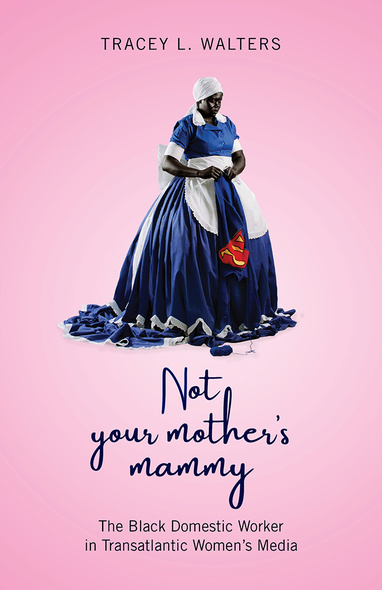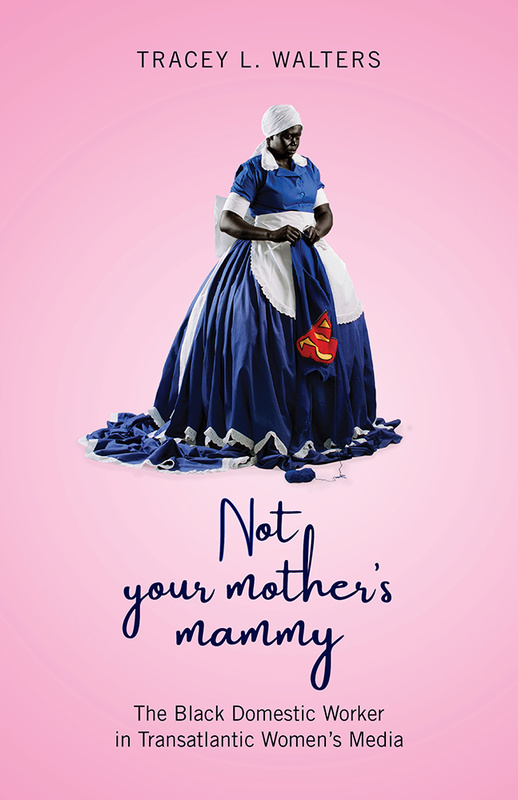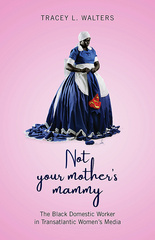
252 pages, 5 1/2 x 8 1/2
4 color images
Hardcover
Release Date:16 Apr 2021
ISBN:9781978808584
Not Your Mother's Mammy
The Black Domestic Worker in Transatlantic Women's Media
Rutgers University Press
Not Your Mother’s Mammy examines how black artists of the African diaspora, many of them former domestics, reconstruct the black female subjectivities of domestics in fiction, film, and visual and performance art. In doing so, they undermine one-dimensional images of black domestics as victims lacking voice and agency and prove domestic workers are more than the aprons they wear. An analysis of selected media by Alice Childress, Nandi Keyi, Victoria Brown, Kara Walker, Mikalene Thomas, Rene Cox, Lynn Nottage, and others provides examples of generations of domestics who challenged their performative roles of subservience by engaging in subversive actions contradicting the image of the deferential black maid. Through verbal confrontation, mobilization, passive resistance, and performance, black domestics find their voices, exercise their power, and maintain their dignity in the face of humiliation. Not Your Mother’s Mammy brings to life stories of domestics often neglected in academic studies, such as the complexity of interracial homoerotic relationships between workers and employers, or the mental health challenges of domestics that lead to depression and suicide. In line with international movements like #MeToo and #timesup, the women in these stories demand to be heard.
What Walters achieves is an aesthetic of the black female domestic, a study of the representational dynamics of the figure in film, visual art, and literature. This book is a fascinating showcase of black women's nuanced reimaginings of servitude's long afterlife.
Tracey Walters weaves together a fascinating story about power and representation of Black domestic workers across the globe. Her attention to Black women artists and writers offers a compelling and empowering portrait of workers who were anything but silent and deferential. These 'quiet radicals,' as Walters describes them, are inspirational models for our time. This is a book about claiming space, giving voice, and, fundamentally, about remaking Black womanhood.'
Challenging mainstream media’s unidimensional portrayal and mis/representation of black female domestic workers as vulnerable and lacking agency, Not Your Mother’s Mammy identifies the myriad ways domestic workers, i.e. essential services workers, engender the politics of subversion and exercise their (labor) rights. This book will certainly influence future studies on labor rights of black female domestic workers.'
TRACEY L. WALTERS is an associate professor of literature in the Department of Africana Studies at Stony Brook University in New York, where she also holds an affiliate appointment with the Department of English and the Department of Women’s and Gender Studies.
List of Illustrations
Introduction
1. Overview: The History of Black Women’s Domestic Labor from the Twentieth Century to the Present
Part 1: Quiet Subversion: The Radical Acts of Working-Class Women in the Domestic Sphere
2. Let’s Hear It from the Maid: Alice Childress’s Like One of the Family
3. Dirty Work: The Representation of Undocumented Caribbean Domestic Laborers in Nandi Keyi’s The True Nanny Diaries and Victoria Brown’s Minding Ben
4. Forbidden Kinship: Homoerotic Desire between the Maid and Mistress in Zanele Muholi’s “Massa” and Mina(h)
Part 2: We Wear the Mask: Servitude, an Art of Performance and Deception
5. A Sartorial Expression of Frenchness in Ousmane Sembène’s Black Girl: A Francophone Revision of Jean Genet’s The Maids
6. Maid in Hollywood: The Art of Performance in Theresa Harris’s By the Way, Meet Vera Stark
7. The Art of Dressing Up in Mary Sibande’s Long Live the Dead Queen
Part 3: Representing for Laure: African American / Caribbean Women’s Reimaginings of Édouard Manet’s Olympia
8. From the Margin to the Center: The Maid in Édouard Manet’s Olympia and the Politics of Recognition in the Artwork of Mickalene Thomas and Renee Cox
9. Kara Walker’s “Marvelous Sugar Baby ‘Sphinx’”: A Satirical Rendition of the Mammy
Conclusion
Acknowledgments
Notes
Works Cited
Index
Introduction
1. Overview: The History of Black Women’s Domestic Labor from the Twentieth Century to the Present
Part 1: Quiet Subversion: The Radical Acts of Working-Class Women in the Domestic Sphere
2. Let’s Hear It from the Maid: Alice Childress’s Like One of the Family
3. Dirty Work: The Representation of Undocumented Caribbean Domestic Laborers in Nandi Keyi’s The True Nanny Diaries and Victoria Brown’s Minding Ben
4. Forbidden Kinship: Homoerotic Desire between the Maid and Mistress in Zanele Muholi’s “Massa” and Mina(h)
Part 2: We Wear the Mask: Servitude, an Art of Performance and Deception
5. A Sartorial Expression of Frenchness in Ousmane Sembène’s Black Girl: A Francophone Revision of Jean Genet’s The Maids
6. Maid in Hollywood: The Art of Performance in Theresa Harris’s By the Way, Meet Vera Stark
7. The Art of Dressing Up in Mary Sibande’s Long Live the Dead Queen
Part 3: Representing for Laure: African American / Caribbean Women’s Reimaginings of Édouard Manet’s Olympia
8. From the Margin to the Center: The Maid in Édouard Manet’s Olympia and the Politics of Recognition in the Artwork of Mickalene Thomas and Renee Cox
9. Kara Walker’s “Marvelous Sugar Baby ‘Sphinx’”: A Satirical Rendition of the Mammy
Conclusion
Acknowledgments
Notes
Works Cited
Index





